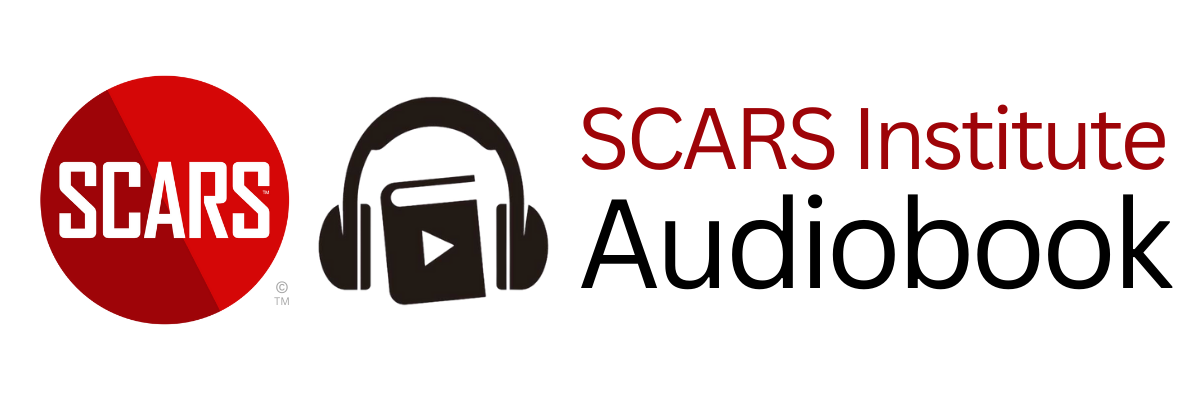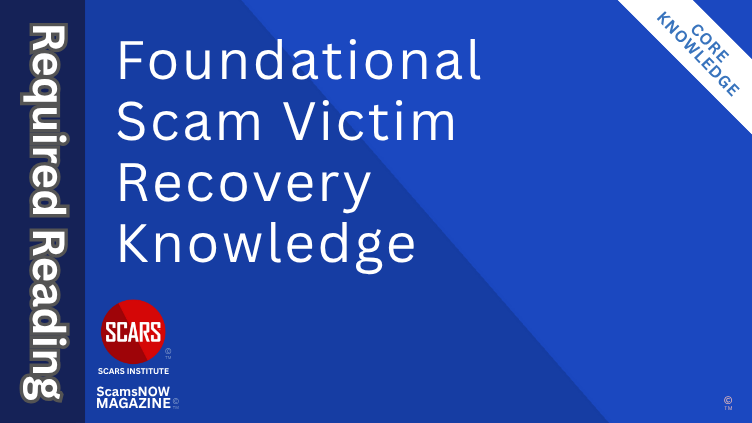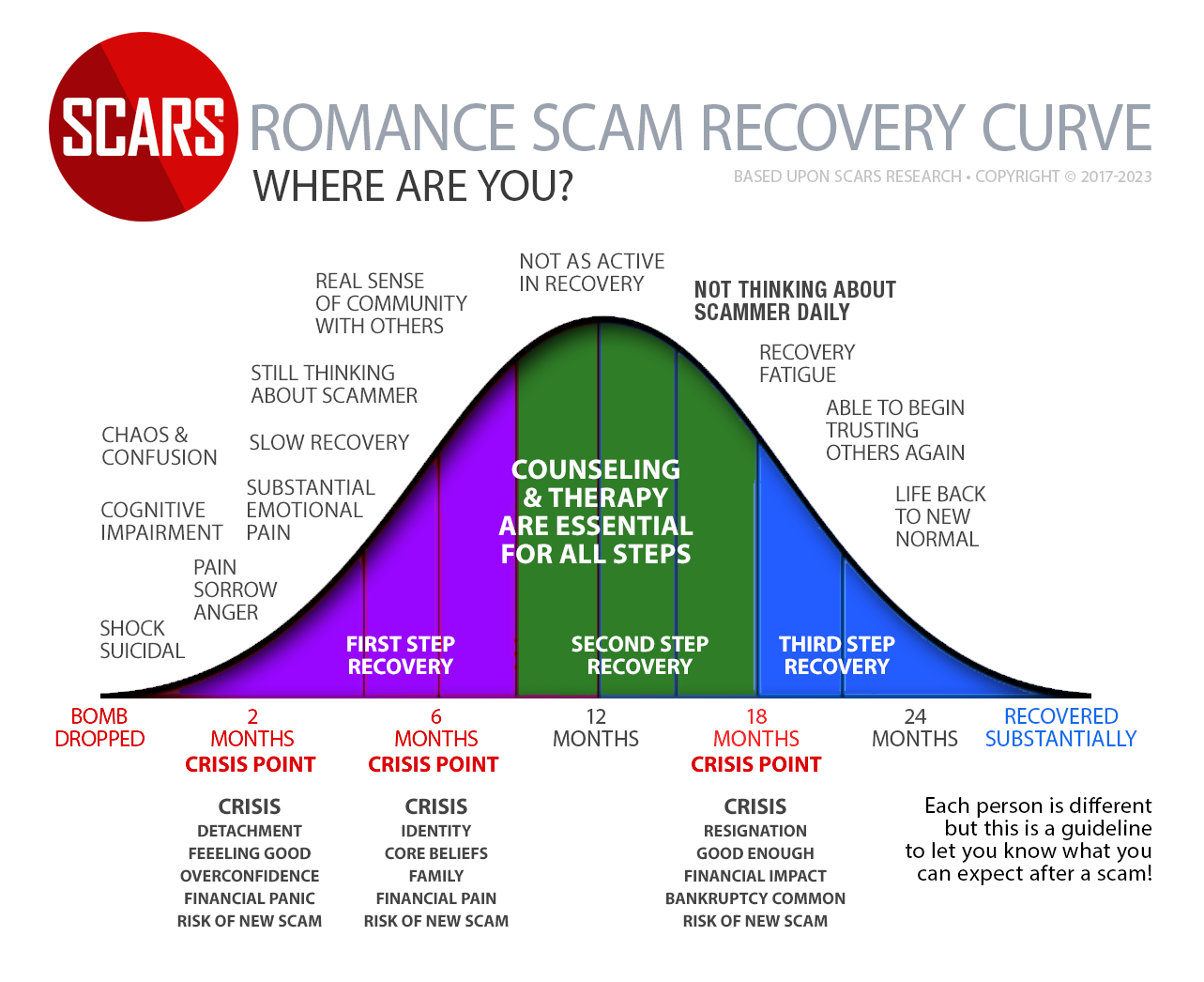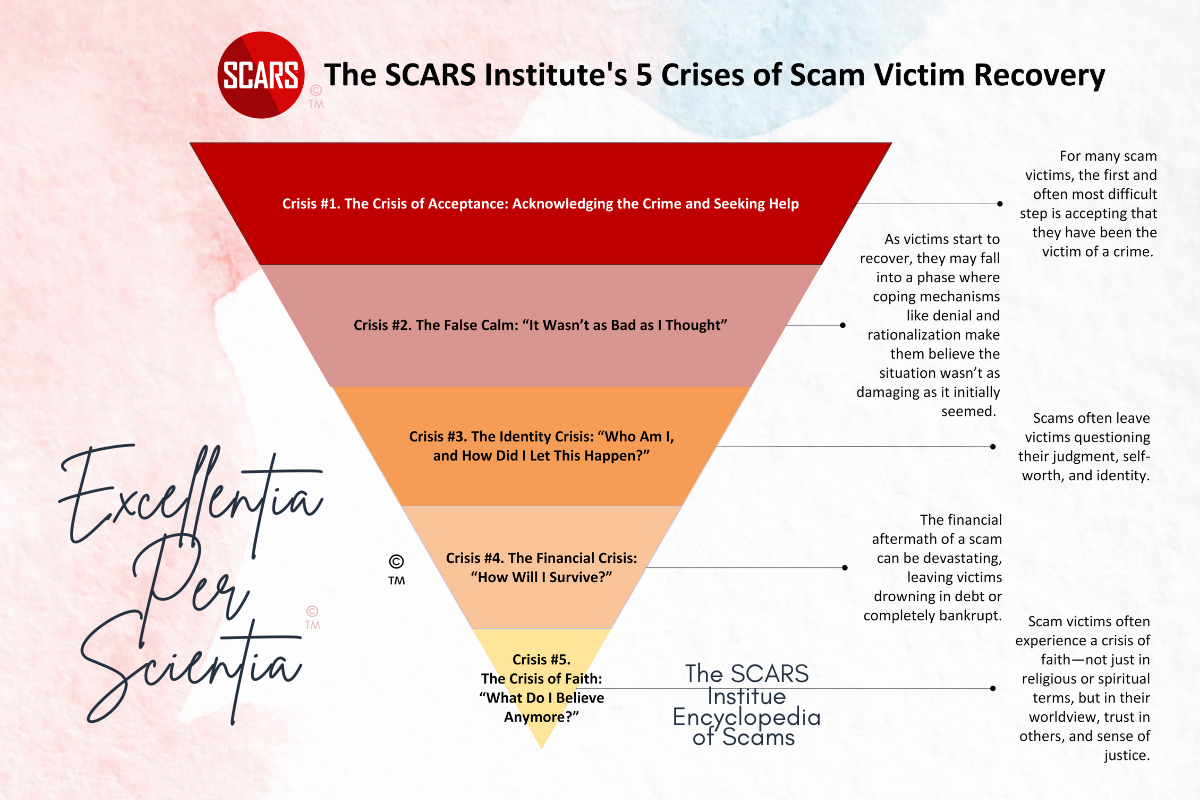
The SCARS Institute Scam Victim Recovery Timeline
Understanding the Full Arc of Scam Victim Recovery per the SCARS Institute Recovery Model
Primary Category: Scam Victim Recovery Psychology
Authors:
• Vianey Gonzalez B.Sc(Psych) – Licensed Psychologist, Specialty in Crime Victim Trauma Therapy, Neuropsychologist, Certified Deception Professional, Psychology Advisory Panel & Director of the Society of Citizens Against Relationship Scams Inc.
• Tim McGuinness, Ph.D., DFin, MCPO, MAnth – Anthropologist, Scientist, Polymath, Director of the Society of Citizens Against Relationship Scams Inc.
About This Article
Scam recovery involves more than emotional pain; it includes a full disruption of identity, trust, and life stability. By combining the SCARS Romance Scam Recovery Curve with the SCARS Institute’s Five Crises of Scam Victim Recovery, you can better understand each phase of your healing journey. These models outline how you progress from shock and denial through identity crisis, financial collapse, and finally into a renewed, if changed, life. This path includes setbacks, illusions of improvement, emotional fatigue, and profound philosophical questioning. The more clearly you understand these stages, the better prepared you are to work through them, with the help of licensed professionals and structured support. You are not alone, and your pain is not a flaw. It is the cost of deep betrayal—and the beginning of real, lasting growth.
Note: This article is intended for informational purposes and does not replace professional medical advice. If you are experiencing distress, please consult a qualified mental health professional.

Understanding the Full Arc of Scam Victim Recovery per the SCARS Institute Recovery Model
Why Healing Takes Time: A Complete Guide to Scam Victim Recovery
Author’s Note: This article presents timelines as a general guide to the typical order of events during scam recovery. These are not fixed dates but approximate markers that can vary widely from person to person. Use them for orientation, not precision. Always rely on your therapist to help you understand your individual progress and where you may be within your own recovery process. Also, this assumes that you are using the information we provide to educate yourself and to develop a survivor’s mindset. If you have not, then we recommend that you enroll in our FREE Scam Survivor’s School at www.SCARSeducation.org
The Curve and the Crises: A Comprehensive Map of Recovery
Recovering from a scam is not a simple process. It is not linear, predictable, or easily summarized by slogans. The SCARS Romance Scam Recovery Curve and the SCARS Institute’s Five Crises of Scam Victim Recovery (see the graphics below) offer a dual framework that, when combined, help you understand what is really happening in your mind, your body, and your life. One represents the emotional and functional trajectory over time, the other outlines the psychological and existential breakdowns that happen at each stage. Together, they give you a clear picture of what to expect, what is normal, and why it feels so overwhelming.
Scam trauma does not stop when the scam ends. In many cases, the worst part is just beginning. This is not a flaw in you. It is the natural impact of betrayal trauma and the neurological, emotional, and cognitive disruption it causes. You may not feel like yourself. You may not even know who you are anymore. And that confusion can be terrifying. But it is also the beginning of recovery.

SCARS Institute Audiobook: Scam Victim Recovery Timeline 2025
Written by Dr. Tim McGuinness and Vianey Gonzalez
Initial Collapse: When the Bomb Drops
The moment you realize you have been scammed is often described as a psychological explosion. This is the beginning of the recovery curve, labeled simply as “Bomb Dropped.” It is a moment of chaos, shock, and cognitive disorientation. On the surface, you might appear numb or panicked. Internally, your nervous system is in a state of emergency. This stage matches Crisis #1 in the Five Crises framework: The Crisis of Acceptance.
In this crisis, you are asked to do the unthinkable, to admit that what felt real was a lie. That the person you trusted was a predator. That your actions, emotions, and identity have been manipulated. The brain resists this. It wants to deny, minimize, or delay the truth. You may go back and reread conversations, looking for signs it was genuine. You may keep hoping it was a mistake. You may collapse into despair. This is normal.
At this point in the curve, suicidal ideation, panic attacks, and emotional breakdowns are common. You may experience detachment, financial panic, and cognitive overload. These are not weaknesses. They are your system’s attempt to make sense of a traumatic rupture. You are not fine. You are in a state of psychological emergency. And that is exactly why professional counseling and trauma-informed support are essential.
Early Recovery: The Illusion of Relief
By the time you reach the 2-month mark, things may look calmer. On the surface, you may appear stable, even optimistic. This is the stage known as “First Step Recovery” in the curve. It aligns with Crisis #2: The False Calm. You may feel like it wasn’t as bad as you thought. You might even believe you are recovering quickly. This can feel reassuring, but it is deceptive. Betrayal trauma and your brain will trick you.
Your brain is trying to protect you. It creates a temporary sense of control by pushing away the full emotional impact. This period may include overconfidence, risky decisions, or impulsive behaviors. You may believe you are no longer vulnerable. In truth, this is one of the most dangerous moments. Many victims fall for a second scam during this window. The pain is not gone; it is simply buried. And buried pain always returns.
Peer support groups can be helpful during this stage, but they must be handled with care. If the group rewards positivity over honesty, you may be pressured to suppress your grief. If your pain is minimized or dismissed, you may experience what SCARS calls positive gaslighting. This kind of false encouragement delays real healing and reinforces shame.
The SCARS Institute recommends that you start therapy with a psychologist who have been train in trauma and dissociation. You can find therepists at counceling.AgainstScams.org
Middle Recovery: The Deep Collapse
By month four to six (approximately,) the temporary calm often fades. You enter what the curve describes as “Substantial Emotional Pain.” This is Crisis #3: The Identity Crisis. The false surface breaks. You start asking harder questions: “Who am I now?” or “How did I let this happen?” or “Why didn’t I see it?” These are not just reflective thoughts. They are symptoms of a full identity breakdown.
Everything feels unstable. You may no longer trust your instincts. Your old values may feel shattered. You might question your intelligence, your judgment, and even your morality. If the scam involved romantic or emotional manipulation, you may also grieve the loss of intimacy, connection, and purpose. This grief is real. The attachment was real, even if the scammer’s intentions were not. You are not grieving a fantasy. You are grieving the betrayal of your emotional investment.
This period is also marked by slow recovery and social withdrawal. You may still think about the scammer every day, even if you try not to. This is not obsession, it is trauma. Your brain has not yet fully processed the betrayal. That takes time, structure, and therapeutic intervention. Without professional support, this identity crisis can spiral into isolation or self-blame. With support, however, it becomes the foundation for rebuilding a more honest and resilient self.
Second Step Recovery: Exhaustion and Financial Crisis
As the recovery curve enters the second phase, around 12 months post-scam, you experience a shift. You (generally speaking) no longer think about the scammer daily, but you are not free of the trauma. You may feel exhausted, both emotionally and physically. This is what the curve describes as “Recovery Fatigue.” It aligns with Crisis #4: The Financial Crisis.
At this stage, the full financial consequences of the scam often emerge. You may face debt, bankruptcy, or damaged credit. You may feel shame about your financial decisions. Family members may pressure you to recover faster than you are able. If the scam affected your career, your home, or your legal status, those issues will now demand resolution. It may feel like you are climbing uphill with no rest.
This is the point where many victims give up on recovery. Not because they are weak, but because the pressure to rebuild feels unbearable. You need support systems that understand trauma, not just finances. Professional counselors, legal advocates, and recovery specialists are essential here. Peer groups can still help, but only if they make space for anger, fear, and failure. If you are only allowed to speak about progress, you will feel more alone than ever.
Late Recovery: Faith and Fatigue
By the 18-month mark, most victims have entered the third recovery step on the curve. This is where trust begins to return, not fully, but slowly. You may start building new friendships or reconnecting with people you distanced yourself from. Yet even in this progress, there is still a lingering pain. That is because this stage aligns with Crisis #5: The Crisis of Faith.
This is not just about religious belief. It is about worldview. You may struggle to believe in justice, in the goodness of others, or in your own future. You may feel disillusioned with institutions, support systems, or even yourself. This is a philosophical crisis. It does not show up as panic. It appears as resignation, numbness, or emotional withdrawal. You might say things like “What is the point?” or “I’ll never trust again.” These statements do not mean you have failed. They mean you are trying to rebuild meaning in a world that no longer feels safe.
Professional therapy is especially important here. Philosophical despair cannot be solved by willpower. It requires deeper reflection, emotional processing, and gradual re-engagement with life. You are not broken. You are asking the right questions. The pain you feel is not a problem to be fixed; it is a signal that you are still fighting to find clarity, honesty, and direction.
Substantial Recovery: A New Normal
By month 24, substantial recovery is possible. You may not feel completely healed, but the scam no longer controls your daily life. You begin to reclaim trust, not just in people, but in your own decisions. You understand the patterns that led to the scam. You know the emotional wounds it left behind. And most importantly, you have developed the tools to manage them.
This is not about “moving on.” It is about integrating what happened into a new and more honest identity. You do not go back to who you were before. That person no longer exists. But you also do not remain trapped in pain. You are changed, but not destroyed.
The final stretch of the recovery curve is where you experience life again. You can laugh without guilt. You can trust with caution and boundaries. You can talk about what happened without shame. The trauma may still visit you, but it no longer owns you.
You have walked through all five crises. You have endured chaos, collapse, disillusionment, and grief. And you have begun to rebuild. That is recovery. That is resilience. And it is possible, even after the worst betrayal of your life.
Conclusion
Recovery from a scam is never quick, and it is never simple. You are not on a straight road. You are on a path with turns, mountains and cliffs, and moments where the ground disappears beneath you. The SCARS Institute Romance Scam Recovery Curve and the SCARS Institute’s Five Crises of Scam Victim Recovery offer you two lenses to understand what has happened to you and what you are still going through. The curve shows how your emotions and functioning change over time. The five crises explain the psychological and existential upheavals that accompany that change.
You are not expected to handle this alone. No one should expect you to understand betrayal, loss, financial ruin, and identity collapse without help. You will need tools. You will need professionals. And you will need time.
What you are feeling is real. The betrayal trauma, confusion, grief, rage, and fatigue are not weaknesses. They are signs that your mind and body are doing their best to heal. You are not broken. You are in recovery. The climb is difficult, but it is possible. As long as you keep moving, learning, and refusing to fake your healing, you are already doing the most honest and powerful thing a person can do after trauma.
-/ 30 /-
What do you think about this?
Please share your thoughts in a comment below!
One Comment
Leave A Comment
Important Information for New Scam Victims
- Please visit www.ScamVictimsSupport.org – a SCARS Website for New Scam Victims & Sextortion Victims.
- SCARS Institute now offers its free, safe, and private Scam Survivor’s Support Community at www.SCARScommunity.org – this is not on a social media platform, it is our own safe & secure platform created by the SCARS Institute especially for scam victims & survivors.
- SCARS Institute now offers a free recovery learning program at www.SCARSeducation.org.
- Please visit www.ScamPsychology.org – to more fully understand the psychological concepts involved in scams and scam victim recovery.
If you are looking for local trauma counselors, please visit counseling.AgainstScams.org
If you need to speak with someone now, you can dial 988 or find phone numbers for crisis hotlines all around the world here: www.opencounseling.com/suicide-hotlines
Statement About Victim Blaming
Some of our articles discuss various aspects of victims. This is both about better understanding victims (the science of victimology) and their behaviors and psychology. This helps us to educate victims/survivors about why these crimes happened and not to blame themselves, better develop recovery programs, and help victims avoid scams in the future. At times, this may sound like blaming the victim, but it does not blame scam victims; we are simply explaining the hows and whys of the experience victims have.
These articles, about the Psychology of Scams or Victim Psychology – meaning that all humans have psychological or cognitive characteristics in common that can either be exploited or work against us – help us all to understand the unique challenges victims face before, during, and after scams, fraud, or cybercrimes. These sometimes talk about some of the vulnerabilities the scammers exploit. Victims rarely have control of them or are even aware of them, until something like a scam happens, and then they can learn how their mind works and how to overcome these mechanisms.
Articles like these help victims and others understand these processes and how to help prevent them from being exploited again or to help them recover more easily by understanding their post-scam behaviors. Learn more about the Psychology of Scams at www.ScamPsychology.org
SCARS INSTITUTE RESOURCES:
If You Have Been Victimized By A Scam Or Cybercrime
♦ If you are a victim of scams, go to www.ScamVictimsSupport.org for real knowledge and help
♦ SCARS Institute now offers its free, safe, and private Scam Survivor’s Support Community at www.SCARScommunity.org/register – this is not on a social media platform, it is our own safe & secure platform created by the SCARS Institute especially for scam victims & survivors.
♦ Enroll in SCARS Scam Survivor’s School now at www.SCARSeducation.org
♦ To report criminals, visit https://reporting.AgainstScams.org – we will NEVER give your data to money recovery companies like some do!
♦ Follow us and find our podcasts, webinars, and helpful videos on YouTube: https://www.youtube.com/@RomancescamsNowcom
♦ Learn about the Psychology of Scams at www.ScamPsychology.org
♦ Dig deeper into the reality of scams, fraud, and cybercrime at www.ScamsNOW.com and www.RomanceScamsNOW.com
♦ Scam Survivor’s Stories: www.ScamSurvivorStories.org
♦ For Scam Victim Advocates visit www.ScamVictimsAdvocates.org
♦ See more scammer photos on www.ScammerPhotos.com
You can also find the SCARS Institute’s knowledge and information on Facebook, Instagram, X, LinkedIn, and TruthSocial
Psychology Disclaimer:
All articles about psychology and the human brain on this website are for information & education only
The information provided in this and other SCARS articles are intended for educational and self-help purposes only and should not be construed as a substitute for professional therapy or counseling.
Note about Mindfulness: Mindfulness practices have the potential to create psychological distress for some individuals. Please consult a mental health professional or experienced meditation instructor for guidance should you encounter difficulties.
While any self-help techniques outlined herein may be beneficial for scam victims seeking to recover from their experience and move towards recovery, it is important to consult with a qualified mental health professional before initiating any course of action. Each individual’s experience and needs are unique, and what works for one person may not be suitable for another.
Additionally, any approach may not be appropriate for individuals with certain pre-existing mental health conditions or trauma histories. It is advisable to seek guidance from a licensed therapist or counselor who can provide personalized support, guidance, and treatment tailored to your specific needs.
If you are experiencing significant distress or emotional difficulties related to a scam or other traumatic event, please consult your doctor or mental health provider for appropriate care and support.
Also read our SCARS Institute Statement about Professional Care for Scam Victims – click here
If you are in crisis, feeling desperate, or in despair, please call 988 or your local crisis hotline – international numbers here.
More ScamsNOW.com Articles
A Question of Trust
At the SCARS Institute, we invite you to do your own research on the topics we speak about and publish. Our team investigates the subject being discussed, especially when it comes to understanding the scam victims-survivors’ experience. You can do Google searches, but in many cases, you will have to wade through scientific papers and studies. However, remember that biases and perspectives matter and influence the outcome. Regardless, we encourage you to explore these topics as thoroughly as you can for your own awareness.


















![NavyLogo@4x-81[1] The SCARS Institute Scam Victim Recovery Timeline - 2025](https://scamsnow.com/wp-content/uploads/2025/04/NavyLogo@4x-811.png)









![scars-institute[1] The SCARS Institute Scam Victim Recovery Timeline - 2025](https://scamsnow.com/wp-content/uploads/2025/04/scars-institute1.png)

![niprc1.png1_-150×1501-1[1] The SCARS Institute Scam Victim Recovery Timeline - 2025](https://scamsnow.com/wp-content/uploads/2025/04/niprc1.png1_-150x1501-11.webp)
Wow. I umm experienced some of the later curves. I have been bouncing back and forth between asking myself why me to how do I move on. I don’t trust people like I should, I don’t think I will get that back 100% so the stages help me understand where I am going and what to expect to a certain degree